ON LAKE SUPERIOR — Joe Baker was at the helm of his 30-foot Trojan cruiser, Just Chillin’, on a foggy, early June morning when he looked back and noticed one of 14 fishing rods hanging over the stern of the boat was bouncing more than usual.
“Ahhh! Fish!” Baker screamed, throwing his cellphone halfway across the boat in his excitement as he dashed back to grab the rod.
ADVERTISEMENT
“It’s a good one! Who’s up?” Baker yelled for someone to take the rod and to reel in the fish, which turned out to be a plump, 6-pound lake trout.
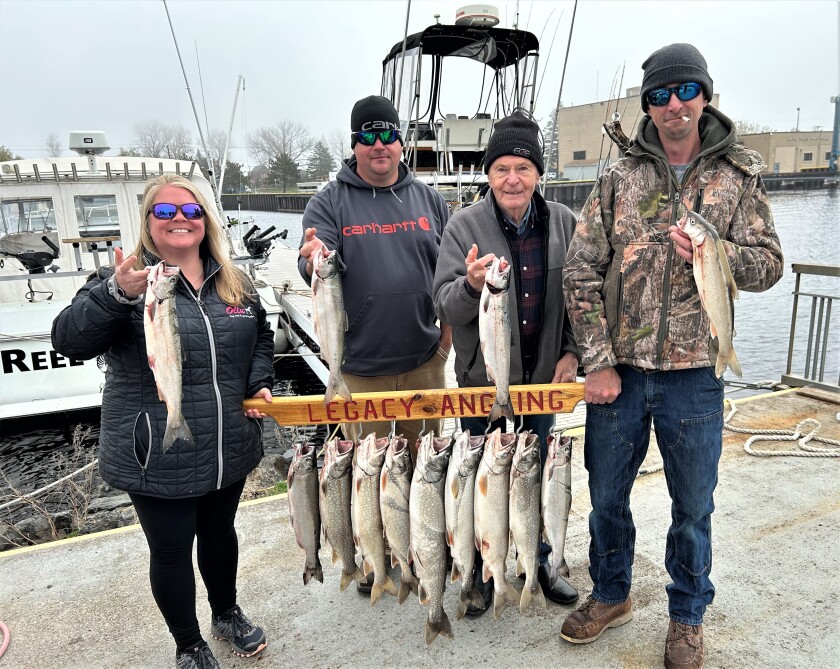
Baker would throw his phone — not on purpose, it’s just an odd reflex reaction when the phone was in his hand when a fish bit — several more times during the four-hour cruise out of Duluth. It turned out to be a very good trip: 13 fish in all, seven lake trout and six coho salmon, for the party of four who had chartered the boat.
“I get a little excited for fish,” Baker acknowledged.
It was a classic Lake Superior early summer morning — 50 degrees, a bit of a northeast wind and fog as thick as peanut butter. It was so foggy at times that you couldn’t see 100 yards out, and Baker was depending on his radar, GPS, auto-pilot and his deckhand/cousin Sam Baker’s eyesight to keep Just Chillin’ separated from any other boats. Any shoreline miles away was entirely obscured and the Aerial Lift Bridge was shrouded until it was just a few hundred feet away.
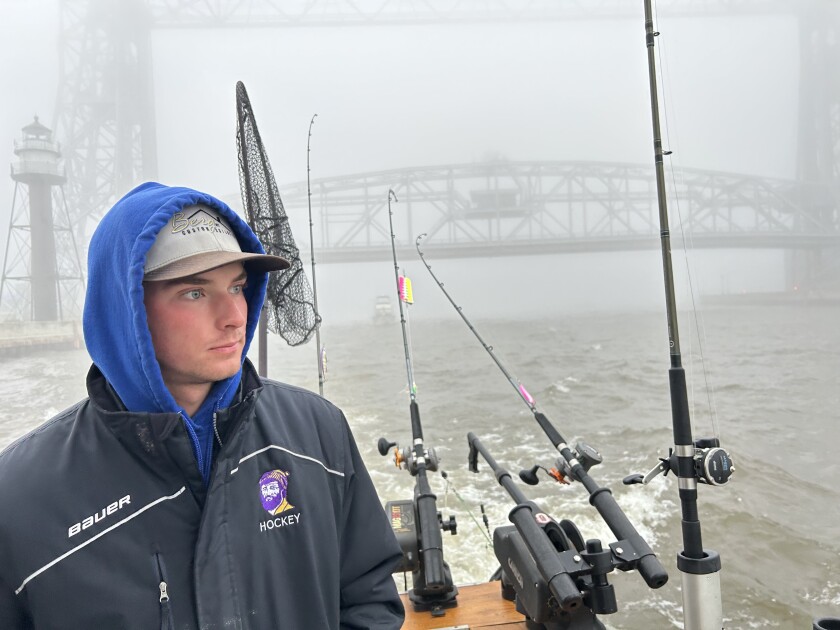
“This is the first time out here for most of us so we had hoped to be able to see the scenery. But we’ll take the great fishing instead,” said Beth Lindquist of Isanti, Minnesota, who was joined on the trip by her dad, Bob Schwantz Sr., her brother, Bob Schwantz Jr., and her husband, Matt Lindquist.
The family took turns reeling in fish that were hitting near the surface, mostly on stickbaits like Rapalas but also a couple on spoons. The water was cold at the surface, 49 degrees, but a thermometer attached to one of the downrigger weights told us it was even colder, just 39 degrees, 35 feet down.
“This lake takes a long time to warm up,” Baker said as he flipped the hood on his sweatshirt up over his head. “There’s not really any structure out here (rocks, reefs, islands, etc.) so you look for the little temperature differences to find the fish.”
ADVERTISEMENT

And Baker found the fish that morning. In addition to the 13 fish that filled his on-board cooler there were another six or seven fish that worked their way off the hooks as they were being reeled in. (And Just Chillin’ wasn’t the only boat catching fish. Charter captains and other anglers out of Duluth reported a crazy-good run last weekend.)
“The old charter captains out here say that, over the whole season and many years, the average turns out to be about one fish (landed) per hour,” Baker said. “So this is above average I guess.”

Starting young
Baker, 20, may be the youngest of the two-dozen or so charter fishing captains that operate out of Duluth each summer. He graduated from Cloquet High �������� in 2021, obtained his Coast Guard certification for chartering and started taking out customers in 2022 under the name Legacy Angling.
Before that, he served as a deckhand for two summer seasons for his eighth grade shop teacher, Cameron Lindner, who is in his eighth season running Team Crush Outdoors charters. Lindner not only served as Baker’s mentor on the big lake, but he also sold him his fishing boat. Lindner’s new boat is now docked in the next slip over from Baker’s at Harbor Cove Marina in Duluth.
“I learned a lot working for Cameron. And it sort of comes naturally for me,” Baker said. “I wasn’t really a morning person before but, being a deckhand for those summers, you get used to it.”

That means being at the dock shortly after 5 a.m. and ready to motor out before the Lift Bridge goes up promptly at 6 a.m.
ADVERTISEMENT
Lindner said he can see from among his middle school students who might be good at being a first-mate deckhand and then keeps them in mind when they hit 16 and get their driver's license.
“I teach with Joe’s dad (Brett Baker) so I knew he could fish,” Lindner noted. “But I also look for kids who can talk with adults, who are responsible, who have people skills.”

Joe Baker met those requirements in spades.
“He knows the lake. He knows the process, And because he was on that boat for two summers, he knows the boat, too,” Lindner said. “It just so happened that I was looking to get into a new boat. … He had the opportunity and the means to buy (Just Chillin’). So it worked out pretty well.”
Lindner said that the teacher and student still converse almost daily about fishing, the upcoming weather and upcoming charter trips. But sometimes now the teacher is getting a little lesson from the student.
“He definitely helps me, and I help him. We are talking all the time,” Lindner said. “He’s good at this. It’s nice to have another set of eyes and ears out there who can help you out.”

ADVERTISEMENT
Compatible careers
At an age when a lot of young guys are more concerned about cars and bars, waiting on tables or working in warehouse summer jobs, Baker has the heady responsibility of not only finding fish for his customers to catch but also ensuring their safety while on the world’s largest lake. He’s using his charter earnings to help put himself through college at the University of Wisconsin-Superior where he’s on his way to a teaching degree.
After graduation he wants to be a physical education teacher and baseball coach during the school year “and then fish out here in the summer,” Baker said. “Not a bad way to earn a living.”
Baker gets his fishing customers from all over, including a few from the Twin Ports area. Most come from the Twin Cities and other parts of Minnesota, but some have come from as far away as California and Florida, tourists looking to capture a true Duluth and Lake Superior experience.
“I had one group from Russia, and only one of them could speak a little English,” Baker said. “I had to show them everything I wanted them to do. … That was an interesting trip.”
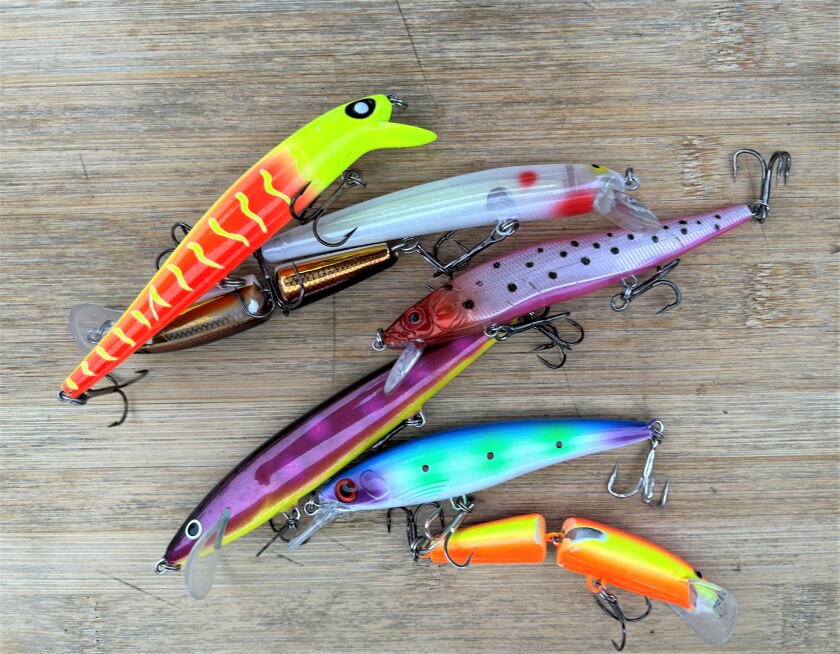
Prospective customers often find Legacy Angling on Baker’s or through . But many are referrals from past customers.
Baker’s charter business started fast in 2022, with 104 trips that summer. So far this summer is shaping up to be a little slower, with some windy days keeping people off the lake.
With gas prices now over $4.40 per gallon for the premium octane that the cruiser’s two big 8-cylinder engines require — engines that at cruising speed require gallons per mile — Baker, like other captains, has had to raise his rates to cover costs that also include dockage fees, state and federal guiding and operating licenses, boat maintenance, insurance, rods and reels and fishing lures. Lots and lots of lures.
ADVERTISEMENT
Native lake trout, which are reproducing on their own and doing well in western Lake Superior, comprise 90% of the catch over an entire season. In April, May and June, coho or silver salmon are regular visitors. Over the season there will also be brown trout, hard-fighting king or Chinook salmon and walleye in the cooler at various times.
“Spring can really be a mixed bag, that makes it fun,” Baker noted. “The only time it’s not fun is when you have a hot, calm, sunny July day and you can't get a fish to bite. It’s a great day to be out here, but not great for fishing.”
Baker grew up chasing bass, walleyes and panfish on smaller lakes with his dad.
“I still go out for crappies or whatever on the little lakes,” Baker said. “But there’s something about Lake Superior that’s special. You never know what you’re going to get, for the weather or the fish or whatever. … It’s always fun to be on such a big body of water.”
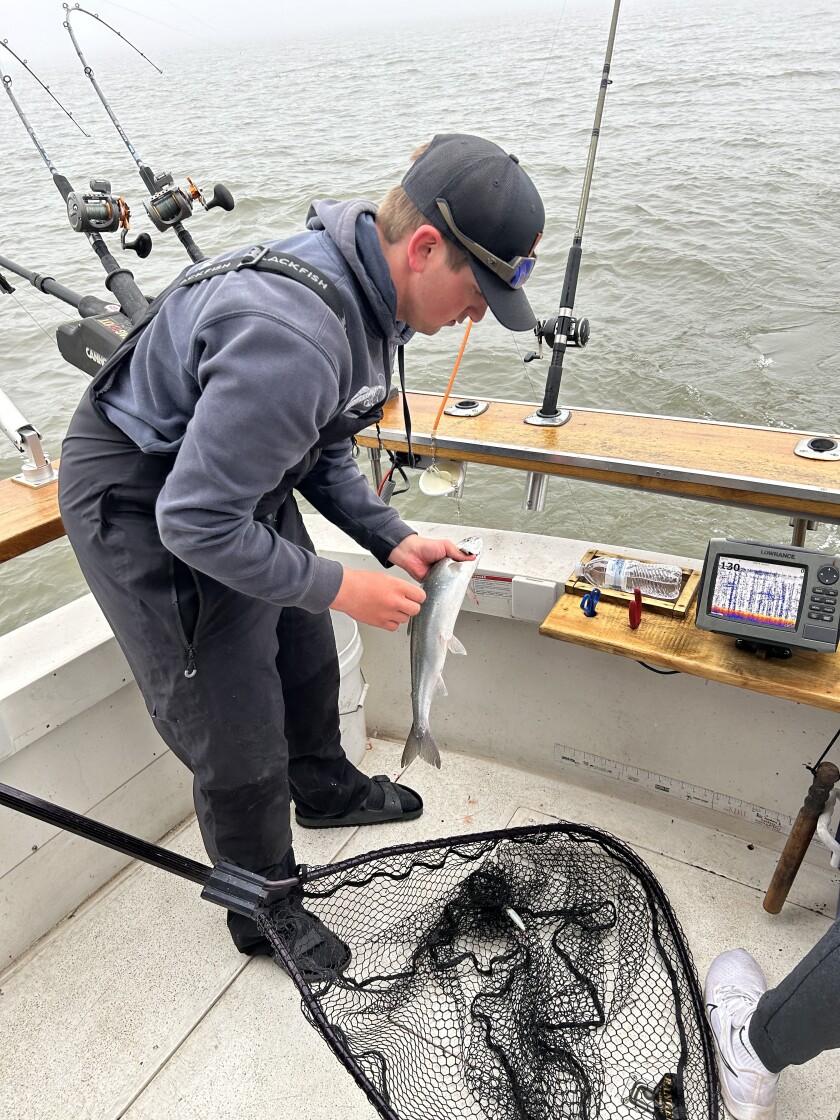
For more information on Legacy Angling
Go to or , call Capt. Joe Baker at 218-393-8192 or email legacyanglingllc@gmail.com .
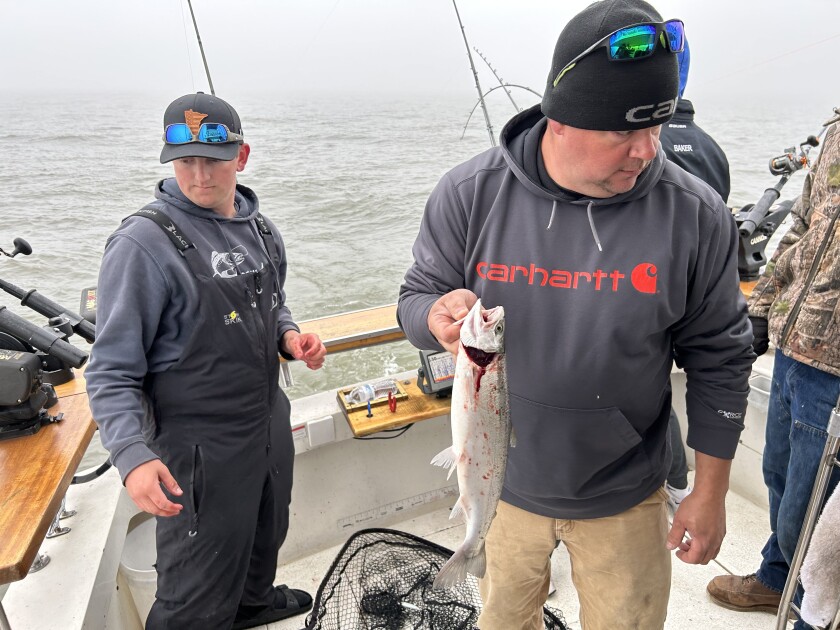
ADVERTISEMENT
What to bring
- A valid Minnesota fishing license and trout stamp.
- A cooler to transport your fish filets home.
- Soft-soled shoes like sneakers.
- Warm clothes for days when the big lake is cold.
- Snacks and beverages.
- Sunglasses and sunscreen.
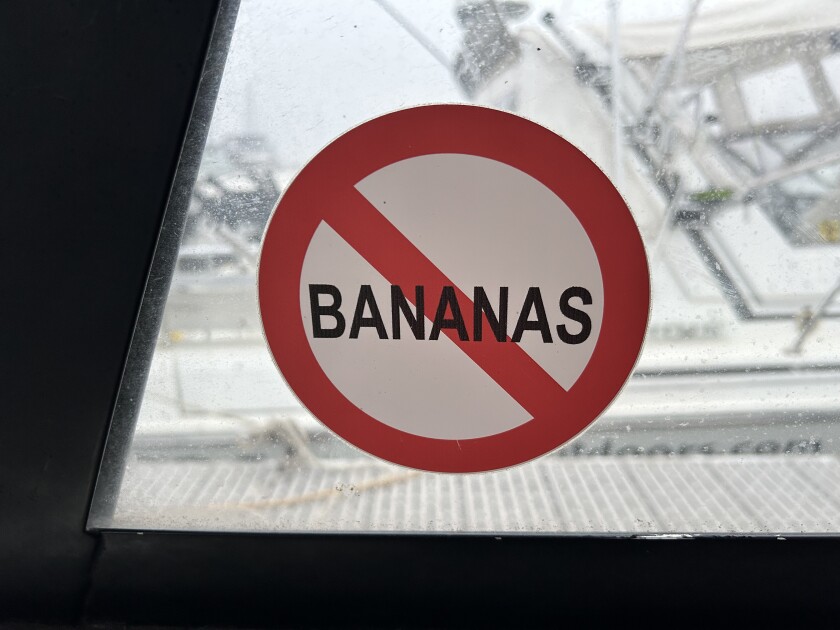
What’s the deal with bananas on fishing boats?
There’s both a warning posted on Joe Baker's Legacy Angling website and a big sticker on the side window of his boat: Absolutely no bananas allowed on board.
It’s an almost universal superstition among charter boat captains, fishing guides and other mariners that bananas, for whatever reason, are somehow bad luck. It’s more of a joke now, but several sources say there was some reasoning behind the banana ban over the centuries:
- Bananas sink ships. The first marginally plausible basis of this superstition stems from the 1700s. When trade ships sailing from the Caribbean back to Europe started to disappear — in storms, or due to bad navigation or whatever — legend has it that only the strange, new-world, curved yellow fruit would be found floating among the wreckage. Seafarers apparently believed the bananas had somehow caused the ships to sink.
- Deadly bugs. Spiders were a problem for early merchants trading bananas. Ships would take on crates of bananas with the crews unaware that spiders often hitched a ride, sometimes even laying eggs that would later hatch on the weekslong voyage home. Most of the spiders weren’t venomous, but the spiders on bananas got blamed for all sorts of maladies on the long cruises that caused sickness or death among the sailors — back in the days before doctors and medicine.
- Bad gas. Bananas, as they ripen and then over-ripen, give off ethylene gas, which can cause other fruits to ripen and, thus spoil more quickly. This unintended result might be a source of concern for ships looking to turn a profit on fresh fruits. In some cases, enough rotting bananas and the ensuing gas buildup may have been responsible for explosions on ships. Others say the ethylene gas may "smell" bad to fish and actually be a fish repellent.
Slip and fall. This one is perhaps the most unlikely but simplest. Sailors were worried people would slip on a banana peel and fall overboard to their almost certain death. Those old, wooden sailboats couldn't exactly stop and turn around on a dime to rescue anyone.
Crossbows appear to have increased buck harvest slightly in 2023 and were popular among younger and older hunters. In Wisconsin, the popularity of crossbows has grown fast in the past decade.
















